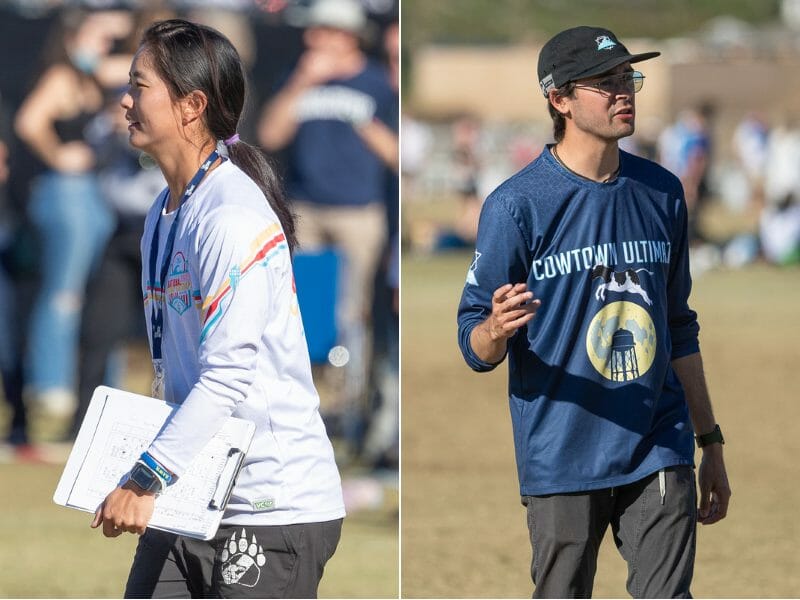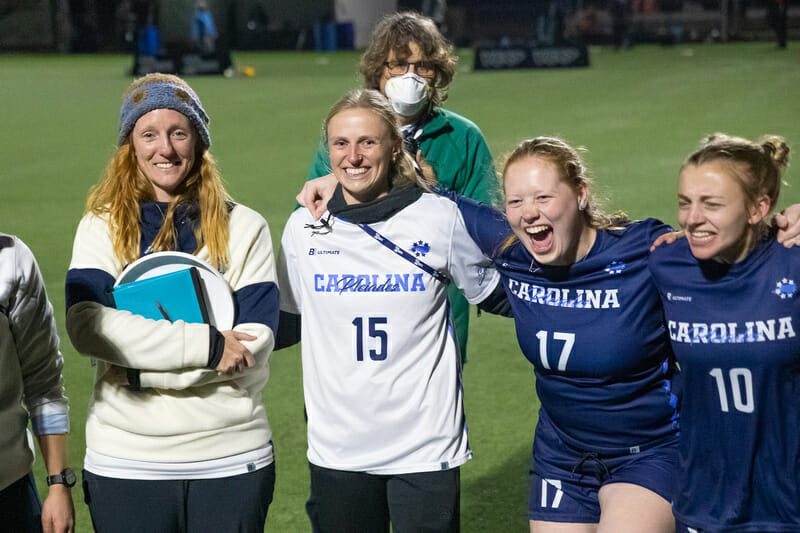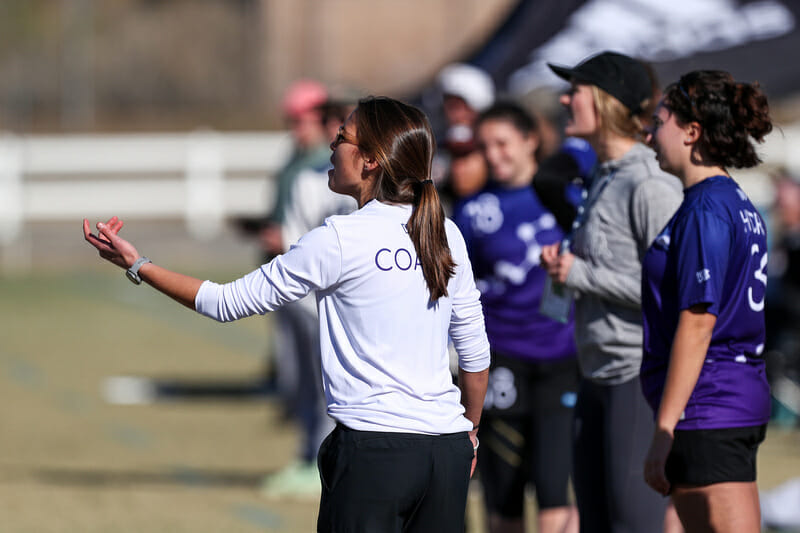The best signal-callers and program builders in the college game this season.
January 27, 2022 by Jenna Weiner and Olivia Alongi in Awards with 0 comments
Ultiworld’s 2021 College Awards are presented by the National Ultimate Training Camp; all opinions are those of the author(s). NUTC helps young players become better athletes and community members.
Each year, Ultiworld presents our annual College Awards. While the 2021 college season certainly wasn’t typical with its abbreviated regular season and the first to host a fall Championship Series, we still want to celebrate and honor the tremendous performances we saw.
Our final D-I award podium is for the Coach of the Year. While the award goes to the head coach, we recognize that could just as easily represent “Coaching Staff of the Year” as so many teams have added more and more sideline-savvy consultants to their roster. Coaches can impact the game in so many ways — tactics, motivation, communication, personnel management, program development, skill-building, etc. — and it can be hard to divine what exactly each has contributed to their team. But good coaching is something that we feel that ‘we know it when we see it.’
- Player of the Year
- Offensive Player of the Year Award
- Defensive Player of the Year Award
- Breakout Player of the Year Award
- Rookie of the Year Award
- Coach of the Year Award
- All-American First Team
- All-American Second Team
D-I Women’s 2021 Coach Of The Year
Cheryl Hsu and Austin Lourie (UC Davis)

In the whole of the D-I Women’s division at college nationals, only one team managed to pull off two upsets by seed, that team being UC Davis Rogue. Davis claimed a win over Georgia Athena in pool play to secure themselves a spot in the bracket, and then took down Texas Melee in their prequarter to advance to a quarterfinal against eventual finalists Washington Element. While Rogue were by no means lacking in talent and were coming out of a highly competitive region, their seeding put them as outsiders to advance to the bracket, let alone the quarterfinals. That they did so in some style, and nearly beat Element too, speaks not only to Davis’ burgeoning players, but the excellence of their coaching staff as well.
To talk about this Rogue program is to talk about Cheryl Hsu. A newly-crowned club national champion and Breakout Player of the Year with Seattle BFG, Hsu brings an intuitive sense of on-field tactics from her elite handling experience to her work coaching Davis. Off the field, though, is where Hsu’s real importance to this version of Rogue emerges. Hsu played her college years at Davis and provided key cultural connective tissue to the rich history of this Rogue program, which traces its history all the way back to the very first college women’s national championship event in 1987. Without Hsu, Davis loses its inspirational leader, its cultural touchstone, and one of its three phenomenal coaches.
Helping lead Davis with Hsu were Davis men’s alum Austin Lourie and Hsu’s BFG teammate Tommy Lin, both of whom joined Hsu on the Rogue coaching staff in Fall 2021. As Hsu and Lin both live in Seattle and were only available for tournaments, local Lourie was the fulcrum around which Rogue was able to continue to develop and ramp up into the Series. With their extensive high-level experience, all three coaches led Davis in implementing an incredibly effective zone that helped stifle some of the best players in the division, most notably Marie Perivier of Georgia in that crucial pool play game. The combination of a strong system, a growing roster replete with veteran and breakout talent, and a trio of superb coaches is a recipe for success for most any team, and for this UC Davis Rogue team, the triumvirate of Hsu, Lourie, and Lin helped make it happen.
1st Runner-Up
Jessi Jones (North Carolina)

When a team is chock-full with fantastic superstar talent, it can be difficult for even outstanding coaching to, well, stand out.1 Such was the case for North Carolina Pleiades in 2021, with six players bringing in experience from playing with club women’s semifinalists Raleigh Phoenix, and a deep roster replete with up-and-coming players from the vibrant Triangle ultimate scene. And yet, the ways in which Jessi Jones, Claire Revere, and the rest of the Pleiades coaching staff managed and motivated their exceptional roster were remarkable in their own right.
For a team with such an abundance of star players, it would have been easy for Jones and company to continue to go back to that same well, relying on the top-end of their roster to carry UNC through. Instead, the Pleiades coaching staff made an intentional decision to ensure that their entire 32-strong roster saw the field as much as possible. That included their semifinal and final games, both of which UNC dominated from start to finish, which saw every single Pleiades player play at least a point in each game.
The trust and care the UNC coaches showed in their whole roster paid off in spades, and that Nationals experience for younger players on their roster will no doubt help this Pleiades program for years to come. As put by Pleiades player and ultimate newcomer Kailyn Lowder after UNC’s title win: “All you want is Jessie Jones to just high-five you and say what you’re doing is great, and I got a high five today and I am so happy!”
2nd Runner-Up
Emma Colavincenzo, Keila Strick, and Brittany Taylor (Virginia)

Virginia’s return to the division’s top tiers has a very familiar flare to it, systems and styles harkening back to their six-year reign as the Atlantic Coast champions, five consecutive quarterfinals appearances at Nationals, and a semifinal berth. The names that once ran those systems on the field — Strick and Taylor — have moved to instructing, orchestrating, and refining them from just outside of its confines. Mix in some outside knowledge from recent Ohio State semifinalist Colavincenzo and Hydra still has one of the strongest and well-executed systems in the division.
What’s incredible is how the coaching staff both imparts that system and sees to its execution. Hydra played Nationals with discipline, understanding, and cohesion. Maybe they are lucky and found 20 players who all excel in each of those areas, but it is far more likely that leadership helped cultivate those characteristics and draw them out of the field.
Hydra faced off with many of opponents whose rosters had more elite club or juniors experience, more Nationals reps, bigger name stars, but just as they had in yesteryear, they banded together and continued to perform as a unit that enhanced one another.
See: Tsang, Matty of San Francisco Fury ↩